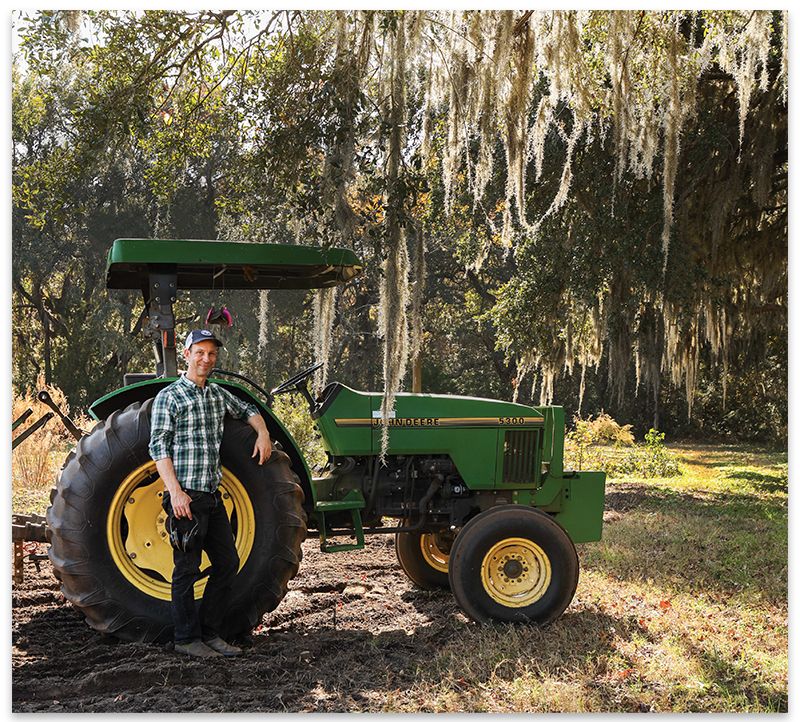Matt Lee and his brother Ted are curating the Certified SC Tent at SEWE

Lives: West Ashley
Education: Bachelor’s in art history from Harvard University
Family: Wife, Gia, and sons, Arthur, Lorenzo, and George
Favorite way to eat grains: Whole, cooked, like farro or brown rice, and added to a roasted root vegetable mix
What are you looking forward to at SEWE? The tastings in the Certified SC tent are always a revelation.
If you go: Find the Certified SC tent at SEWE February 17-19 in Marion Square.
Matt Lee is one half of the Lee Brothers, known for their years celebrating South Carolina cuisine, both in the pages of Charleston magazine and a plethora of national publications, including Travel + Leisure and The New York Times. From a specialty food product catalog to three cookbooks and Hotbox (Henry Holt & Co., 2019), a nonfiction look behind the high-level catering curtain, to television, radio, and even theater, Lee has established himself as a media personality and an expert on Southern food. He’s also been working with the SC Department of Agriculture for years, including programming the popular farmer and chef demonstrations at SEWE, hosted onstage in the Certified SC tent.
But these days, in a reality far away from e-mails and deadlines, there are fields of rye beginning to strengthen their stalks as the days lengthen and the sun slants over the sandy soil of John’s Island. Lee has taken up farming on 45 acres of former tomato fields on the sea island minutes from Charleston’s best tables. And chefs are already taking note of the grains he’s producing. We sat down with him to understand what prompted him to buy a tractor and slide on those work boots.
CM: What was it that moved you from writing about food to farming and becoming a “local source” yourself?
ML: Working with the SC Department of Agriculture is a daily reminder of the interconnected nature of chefs, farmers, and home cooks, and to see that relationship blossom each year on the SEWE Certified SC stage is significant, to be sure. In general, our journalism work allows one to drop into other food people’s lives and live them for a few days, and so at a certain point, you do tend to imagine: what if? Farming, frankly, has always been fascinating to me.
But the true catalyst, the indulgence to take that step and try it out, was a pandemic opportunity. A longtime family friend asked me to find a tenant farmer to work his former tomato fields, and I looked for months for someone willing to tackle the acreage [45 acres is too small for many traditional row crop farmers and too big for the modern micro-farming trend]. I didn’t find one. I woke up one day and thought, “Wait, I am the farmer!” I bought a tractor on Craigslist, and I was hooked.
CM: So why did you choose to grow cereal grains, and specifically, start with Aroostook rye?
ML: Well, despite it being fun to have some skin in the game, I didn’t want this to be my full-time job, so I chose the path of least resistance, which in this climate, meant to plant in the fall and harvest in early summer. Winter-habit cereal grains germinate in cold, don’t require irrigation, and because they strengthen just as weeds start to emerge, they don’t compete with things like dollar weed or nut grass and the million other weeds farmers have to contend with here in the summers. The grains pretty much have the fields to themselves; they mature, and then begin to dry out in May.
All these grains are usable as seed, for distilling, brewing, milled flour, and as a cooked grain, similar to something like farro. I’ve been pressure-cooking the rye and then freezing it in quart containers for easy add-ins to salads or vegetable dishes that need more substance and nutrition. It has a wonderful bready, nutty flavor and a lovely, springy texture.
CM: What is something that you’ve learned through experience that you hadn’t learned through close observation?
ML: I’ve begun selling directly to chefs—John Ondo at the Atlantic Room at Kiawah was one of my first customers—but trying to farm and also market your product is almost impossible. Farming is all-encompassing and exhausting, and it’s hard to find the bandwidth at the end of the day for sales and marketing. I am learning firsthand what every farmer is up against in the food system.
Our mission at SEWE is to try to close that gap between farmers and chefs, and so this year, the Certified SC Cooking Stage will feature South Carolina farmers from at least five counties and chefs from at least four, including three newly appointed SC Chef Ambassadors. It’s nice to see the flow of understanding between chef and farmer happen in real time. Now that I’m a little bit of both, it feels like a piece of the puzzle has fallen into place.